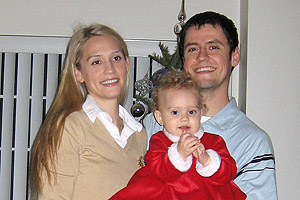Request Information
Learn More About PUC
- Home
- About PUC
-
Academics
-
All Departments
- Aviation
- Biology
- Business Administration & Economics
- Chemistry
- Communication
- Data Science
- Education
- Emergency Services
- English
- Global Health
- History
- Honors
- Kinesiology and Health Sciences
- Mathematics & Physics
- Music
- Nursing & Emergency Management
- Paramedic
- Pre-Allied Health
- Pre-Professional Programs
- Psychology & Social Work
- Social Work
- Theology
- Visual Arts
- World Languages
- AS in Nursing with Adventist Health
- Faculty Directory
-
All Departments
- Admissions & Aid
- Alumni
- Athletics
-
Life at PUC
Alumna's Research Makes National News
By Lainey S. Cronk on February 28, 2006

Judith Pizarro is still a student, but her name has been showing up in national news. Now studying for her Ph.D. in health psychology at UC Irvine, this 1997 PUC graduate did a master’s project on Civil War veterans that is now catching the eye of the media.
When Pizarro first heard about the grant from the University of Chicago for Civil War data, she thought, “This is funny—what could you do with that?” But the more she looked into it, the more she realized what a solid, accessible data source the university’s information provided. For 15 years, the National Institute of Health has funded the University of Chicago in amassing Civil War data, and the painstaking medical assessment interviews that the government did on the Civil War veterans are an invaluable resource.
So with two colleagues, Pizarro set out to explore the effects of traumatic war experiences on nervous and physical disease and mortality among the veterans. Their discoveries, which indicate that post-war health was influenced by the level of military trauma experienced and the age of the soldiers, seem also to reflect the more recent experiences of Vietnam soldiers.
“We don’t have access to these kinds of records from Vietnam,” Pizarro says. But in some ways she’s glad the study was based on an older war, because “it affects a broader population—and we’re getting the word out more.”
Aspects of this research may be relevant today, as well. “There were such young people fighting in the Civil War, and they were the most affected,” Pizarro explains. “The research is saying that we must guard young people going into military service. A lot of people don’t want to hear that!” But, she adds, negative reactions are expected in reaction to any research.
Meanwhile, many people have shown a much more positive interest in the study. “I’m continually shocked at how interested people are in the Civil War,” Pizarro says. And she may have a future project cut out for her as well: “I’ve received a lot of e-mails saying, ‘I had 3 relatives in the war and we’re still feeling the effects... Have you looked at the intergenerational effects?’ We haven’t, but it would be something interesting to do!”
When Pizarro first heard about the grant from the University of Chicago for Civil War data, she thought, “This is funny—what could you do with that?” But the more she looked into it, the more she realized what a solid, accessible data source the university’s information provided. For 15 years, the National Institute of Health has funded the University of Chicago in amassing Civil War data, and the painstaking medical assessment interviews that the government did on the Civil War veterans are an invaluable resource.
So with two colleagues, Pizarro set out to explore the effects of traumatic war experiences on nervous and physical disease and mortality among the veterans. Their discoveries, which indicate that post-war health was influenced by the level of military trauma experienced and the age of the soldiers, seem also to reflect the more recent experiences of Vietnam soldiers.
“We don’t have access to these kinds of records from Vietnam,” Pizarro says. But in some ways she’s glad the study was based on an older war, because “it affects a broader population—and we’re getting the word out more.”
Aspects of this research may be relevant today, as well. “There were such young people fighting in the Civil War, and they were the most affected,” Pizarro explains. “The research is saying that we must guard young people going into military service. A lot of people don’t want to hear that!” But, she adds, negative reactions are expected in reaction to any research.
Meanwhile, many people have shown a much more positive interest in the study. “I’m continually shocked at how interested people are in the Civil War,” Pizarro says. And she may have a future project cut out for her as well: “I’ve received a lot of e-mails saying, ‘I had 3 relatives in the war and we’re still feeling the effects... Have you looked at the intergenerational effects?’ We haven’t, but it would be something interesting to do!”
Latest News
PUC’s Department of Music Hosts Unforgettable Festival
By Ally Romanes on April 3, 2025
Rasmussen Art Gallery Hosts Annual Faculty Show
By Ally Romanes on March 24, 2025
Vox Pro Musica & Mosaic Strings Tour Phoenix
By Ally Romanes on March 13, 2025
